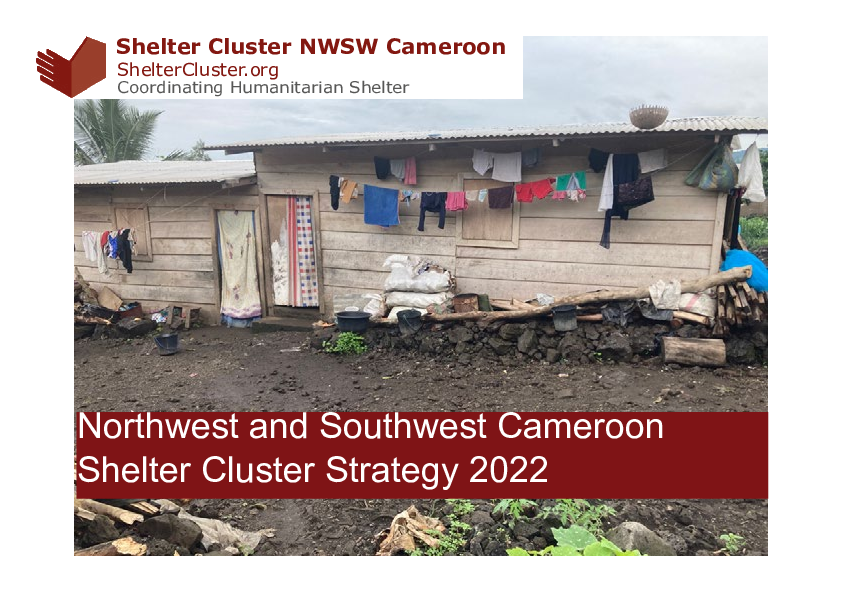North West South West
2022 Northwest and Southwest Cameroon Shelter Cluster Strategy
The Shelter/NFIs Cluster has been active since 2018 for the North West South West regions of Cameroon together with 7 other clusters to support the response to the ongoing crisis in both regions. The cluster in NWSW is led by UNHCR. The Cluster has 25 members who participate in Cluster meetings. During the first four months of the year, only 10 organizations have reported funding for activities that are part of the Shelter Cluster’s strategy. In 2022, the security situation in the Northwest and Southwest Regions has continued to be unstable. In reviewing the last three years of incidents of violence against civilians and number of victims, there seems to be a decline in both the number of victims and incidents as compared to 2020 and 2021. Nevertheless, such incidents occur on a near weekly basis and almost daily basis in the Northwest region. The homes of residents of the Northwest and Southwest regions are often targeted by both State Security Forces (SSF) and Non-State Armed Groups (NSAGs). In addition to documentation done by Amnesty International[1] and the BBC[2], the Shelter Cluster has further documented that homes are targeted for destruction by both perpetrators to the conflict. According to a recent Shelter assessment conducted by Plan International, 58% of returnees and 38% of non-displaced in the Northwest region and 44% of returnees and non-displaced respectively in the Southwest region (Plan assessment) reported that their shelters had been damaged. The Special Rapporteur on the right to adequate housing has designated a name for the systematic and deliberate destruction of homes during or after violent conflict with the intent of causing further suffering known as domicide.[3] The Shelter Cluster will continue to document the scale of this phenomenon within the Northwest and Southwest regions while implementing this year’s strategy. That this practice is a feature of the conflict is also testimony to the fact that lack of adequate shelter is causing a significant proportion of the human suffering in the Northwest and Southwest regions.
Entering into its fourth year of the Shelter Cluster approach in the Northwest and Southwest regions and fifth year of the conflict, many of the internally displaced people are becoming protracted in their displacement. Simultaneously, there has been a recorded increase in the number of people returning home both from situations of internal displacement elsewhere in the two regions or from the West or Littoral regions. Returnees are often returning to homes that are damaged. New estimated figures from the OCHA Multi-sectoral Needs Assessment (MSNA) conclude that there are now an estimated 366,300 IDPs, with 234,100 IDPs in the Northwest region and 132,300 IDPs in the Southwest region. The MSNA also identified an estimated increase in returnees with, 371,900 returnees, with 238,600 returnees in the Northwest region and 133,600 in the Southwest region. According to data collected by Plan International in a household assessment funded by UNHCR, 89% of IDPs in the Northwest Region and 90% of IDPs in the Southwest region are living in houses with the majority of the homes being sun-dried mudbrick shelters in the Northwest, and the majority of homes being made of timber in the Southwest region. According to the OCHA MSNA, the dominant strategy of internally displaced people is still to be hosted by host families, indicating that overcrowding in shelters is still a concern. 52 % of IDPs in the Northwest region and 46% of IDPs in the Southwest region are estimated to be living with hosting families. Renting is also a frequent strategy of IDPs, indicating that affordability of shelter is a concern for the internally displaced in both regions. 30% of IDPs in the Southwest and 13
[1] https://www.amnesty.org/en/latest/news/2021/07/cameroon-satellite-images-reveal-devastation-in-anglophone-regions-2/
[2] https://www.bbc.com/news/world-africa-44561929
[3] https://www.ohchr.org/en/calls-for-input/calls-input/call-input-protecting-right-adequate-housing-during-and-after-violent

